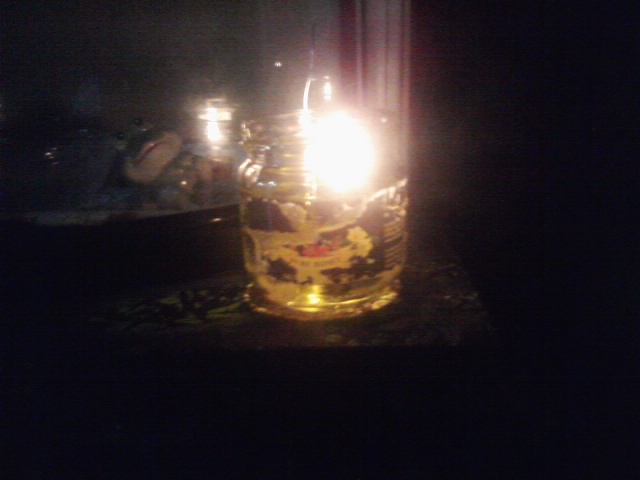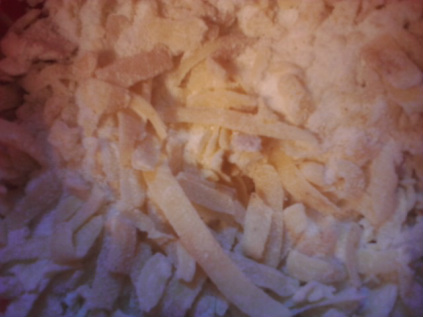I love crusty bread dipped in olive oil and herbs, and I make a rosemary and myrrh infusion with olive oil that is a tremendously good scalp treatment for encouraging hair growth. A friend I had many years ago swore by it as a hair conditioner and I have never doubted her!
Olive oil was used (and may still be) for anointing, and I like to imagine that the lamp the Genie popped out of in the story of Aladdin was filled with it before the genie took up residence inside. It never hurts to have back up sources of illumination, and it's a simple little project to whip up some olive oil lamps with empty pickle jars, orphaned water glasses, even the olive oil bottle-pretty much any sort of vessel that will hold some oil and a wick. An olive oil lamp is ever so much better than one of those stinky petrochemical burning lanterns, and one can get as creative or lazy as one likes with the design. (You can guess from the picture that I was feeling creative and rather lazy at the same time!) Many years ago, a woman told me that sweet oil was good for treating ear aches. What is sweet oil but wonderful olive oil in disguise? If one happens to be a bit on the constipated side, sometimes a straight tablespoon or two of olive oil will get things moving. If it doesn't have some more-there are no ill effects!
0 Comments
5/29/2014 The Importance of Ingredient Disclosure-We have the right to know Exactly what a product containsRead NowI believe that the consumer should know exactly everything that is in a product, whether it is regarded as safe by the powers that be in charge of such things or not.
I also believe that if an ingredient used to make a product is changed by a chemical reaction, then it is not important to list it, since it is no longer present in the end result. It is important to list the end result because that is what we have. Some people can be harmed by even traces of certain substances-such as nut traces. It is important to make it clear about whether or not the possibility of nut traces exist for a product, and thankfully, this is included in product labeling. Sometimes I forget to list purified water as an ingredient on my soap labels when in fact there is a trace amount of water left in the finished soap-especially a freshly made soap-ugh! I don't mean to do that! It violates my principle of stating exactly what is in the soap! I do apologize for this, and rest assured-this is the only ingredient in a finished soap or other creation that I forget to list. I think it happens because I consider that trace amount of water to be truly extraneous. Purified water truly is harmless, isn't it? Another thing that I do not usually do is list my ingredients by their fancy scientific names. I can-but-I just don't want to. I want to list ingredients in easily interpreted language. I don't think spicing up my labels with inflated language and technical terms does anything to enhance the quality of the product. it's already good, or I wouldn't offer it. I do love addressing my plants by their scientific names when I'm out puttering with them-but I'm not going to inflict this on everyone! I also won't say anything about a soap or other product that isn't absolutely proven. I can't say that certain substances are definitely good for wrinkles, skin tone, etc. I do mention what substances have been historically used for in folk medicine, or metaphysical references, and sometimes aroma-therapeutic references, but I cannot assert vehemently that the substances absolutely worked for whatever uses they were put to. I believe whimsy is O.K. for amusement and that truth is more important than increasing sales. It would be nice to be able to say my soap is natural, but I can't do that even though it is made with natural ingredients. The thing holding me back is that the key ingredient to the whole reaction is most definitely not natural. Sodium hydroxide (lye) is man made either by electrolysis or combustion. I suppose that a forest fire would leave some lye behind in the ashes, but how often does the opportunity arise to go on a wood ash extraction mission from a naturally caused forest fire? To produce a soap that I could confidently call 100% natural, that is exactly what I would have to do. The most accurate and truthful thing that I can say is that my soap contains natural ingredients. The soap that is found in nature is a by product of bacterial action on certain tissues in corpses so I am speculating that another way to produce an all natural soap would be to isolate and culture the bacteria responsible, create the perfect environment for them, and let them act upon fats and oils. Ugh though-I haven't run across any documentation of this happening between bacteria and plant oils! I believe that it is possible to breed a strain of bacteria that would produce soap from plant oils. If this was done, wouldn't such soap then be considered GMO soap?
What happens to a soap that I no longer feel affection for, and why/how could such a thing ever happen? I mentioned elsewhere that I have developed sensitivities even to some essential oils over time-especially oils used in soap and body care products. I still have soap hanging around that I can no longer use to wash my entire bod with and I don't want it to go to waste, nor will I sell anything that has ever given me an itch. These soaps that have fallen out of bod favor find favor in other service. One thing I do is turn them into Do it My Self laundry mix. This works out well-as long as the clothes get well rinsed-particularly for any soap that contains citrus or evergreen essential oils. This ginger and orange soap was great..for a week and then..no more ginger and orange for me! So, I grated several bars and mixed it with borax and baking soda (I'm not particularly careful about the proportions) to make a coffee container full. I will get about 7 loads done with this. True, it does not whiten and brighten like detergents loaded with a plethora of chemical agents, or bleach-but I really can't stand bleach and so many stinky detergents. I love the citrus essential oil scents-I just can't wash my bod with them(even diluted). Another thing to keep in mind with citrus essential oils is that they can cause photo toxicity. If you want to whiten your whites naturally-try boiling them like laundry was done in the old days. Yes-it's a LOT of work if you have a lot of laundry to do, (I have done this-on a fire, with a huge wash pan, and a paddle) and I absolutely will not touch a scrub board, but I do boil a particularly dingy white article from time to time and it does work well...the easy way-with a convenient pot on a convenient modern cooking appliance.
I would love to make a true rose soap, but the price has been prohibitive. High quality true rose essential oil has a price tag in the triple digits for less than an ounce. Who wants to pay $35-$40 for a bar of soap? Rose essential oil has a reputation for doing magical things for the skin, but it's the smell that I covet. The smell is a sure thing drive me crazy with pleasure deal. I can put rose petals in my soap, I can put rose petal decoctions into my soap, I can put rose infused oil into my soap-none of which compare to rose essential oil in the smell category. Thank goodness there are a few essential oils that mimic the real deal in quite satisfying ways and are much more affordable! Rose geranium and palmarosa essential oils impart rose similar scents that I can live with. I especially like to blend the two together. Palmarosa essential oil comes from a type of grass-isn't that interesting?
So far, I have not had any negative reactions to these two oils. I cannot say the same for citrus oils, evergreen oils and several spice oils. No ginger essential oil scented soap here, I hate to say! Absolutely no citronella either. |
Details
|


 RSS Feed
RSS Feed
